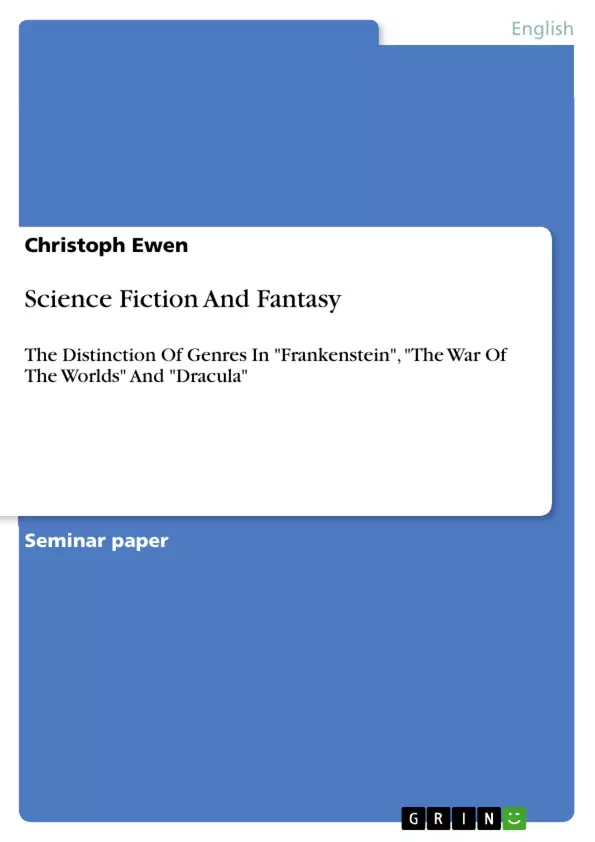What makes a text a science fiction text? What makes it a fantasy text? In
this study, I would like to discuss why it is impossible to clearly draw a line
between these two genres. In order to do so, I am going to focus on the
“justification” of the unreal, respectively, the supernatural elements of a
story. I shall be discussing why a text can be considered a science fiction
text or a fantasy text – and why, in some cases, there is no clear answer to
the question of which genre a text is belongs to. While one might answer the
two questions put at the beginning of this study rather quickly by stating a
rule of thumb – scientific elements make a text a science fiction text,
magical ones make it a fantasy text – it is obvious that this would lead to a
very broad definition. It is thus necessary to go into detail, which I am going
to do. In order to investigate what, apart from the technical and the magical
elements, are the characteristics of the respective genres mentioned at the
beginning, I am going to give the definitions of these terms which can be
found in standard reference texts. In order to go into detail, I shall add more
information from academic literature about the fantastic genre, which both
science fiction and fantasy are part of. I would then like to go a step further
by testing the definitions with the help of three texts – H.G. Wells's The
War of the Worlds as an example for the science fiction genre and Bram
Stoker's Dracula as an example for a fantasy text. In addition, I shall be
discussing Mary Wollstonecraft Shelley's Frankenstein. In this text, there
are elements of both science fiction and of fantasy. After this, I would like to
conclude my study.
Any selection of texts will necessarily be arbitrary, as it is impossible
to include everything into a study like this. I chose three texts from
approximately the same period, as this will provide a sound basis. In
addition, these texts are widely known, and there is generally no dispute
over the fact that they are part of the fantastic genre.
Inhaltsverzeichnis (Table of Contents)
- Introduction
- The Roots: Fantastic Literature
- Science Fiction: The Literature Of Change
- Toward A Definition Of Fantasy
- The Three Novels
- What Makes The War Of The Worlds A Science Fiction Text?
- What Makes Dracula A Fantasy Text?
- Frankenstein: Something In Between
- Conclusion
Zielsetzung und Themenschwerpunkte (Objectives and Key Themes)
This study aims to investigate the blurred boundaries between science fiction and fantasy by analyzing the "justification" of unreal or supernatural elements within these genres. The analysis focuses on defining the characteristics of each genre and examining how these definitions apply to three well-known texts: The War of the Worlds by H.G. Wells, Dracula by Bram Stoker, and Frankenstein by Mary Wollstonecraft Shelley. Through this examination, the study seeks to highlight the challenges of categorizing texts within these genres.
- The nature of the unreal and supernatural in science fiction and fantasy
- The definitions and characteristics of science fiction and fantasy
- The challenges of defining and classifying texts within these genres
- The role of scientific and magical elements in defining genre
- The application of genre definitions to specific literary works
Zusammenfassung der Kapitel (Chapter Summaries)
- Introduction: The study introduces the central question of how to distinguish between science fiction and fantasy texts, highlighting the difficulty of drawing clear lines between these genres. It also discusses the concept of "justifying" the unreal elements in a story and sets the stage for examining the characteristics of each genre through specific examples.
- The Roots: Fantastic Literature: This chapter establishes the common root of science fiction and fantasy within the broader category of "the fantastic". It discusses the concept of the "Novum" (a new element that distinguishes fiction from reality) and how science fiction differs from fantasy in terms of the explicability of this new element.
- Science Fiction: The Literature Of Change: This chapter focuses on defining science fiction, exploring the role of scientific development and its impact on society. The chapter highlights the difficulty of creating a definitive definition, as the genre encompasses a variety of elements and themes.
Schlüsselwörter (Keywords)
The study focuses on key terms and concepts related to the distinction between science fiction and fantasy, including the justification of the unreal, the concept of the Novum, the characteristics of both genres, the role of scientific and magical elements, and the categorization of literary texts. It examines the application of these concepts to specific works like The War of the Worlds, Dracula, and Frankenstein.
Frequently Asked Questions
What is the main difference between science fiction and fantasy?
Generally, science fiction relies on scientific or technological justifications for unreal elements, while fantasy uses magical or supernatural explanations.
What is a "Novum" in fantastic literature?
A "Novum" is a new element or innovation within a story that distinguishes the fictional world from our reality.
Is Mary Shelley's "Frankenstein" science fiction or fantasy?
The study suggests it sits in between, as it contains scientific elements (biology/chemistry) but also shares themes with the gothic and fantastic traditions.
How does "Dracula" exemplify the fantasy genre?
Bram Stoker's Dracula is considered fantasy because its supernatural elements (vampirism) are not explained by science but by myth and folklore.
Why is it hard to draw a clear line between these genres?
Many texts blend technical and magical elements, making categorization difficult and often arbitrary depending on the definition used.
- Quote paper
- Christoph Ewen (Author), 2013, Science Fiction And Fantasy, Munich, GRIN Verlag, https://www.grin.com/document/276802



